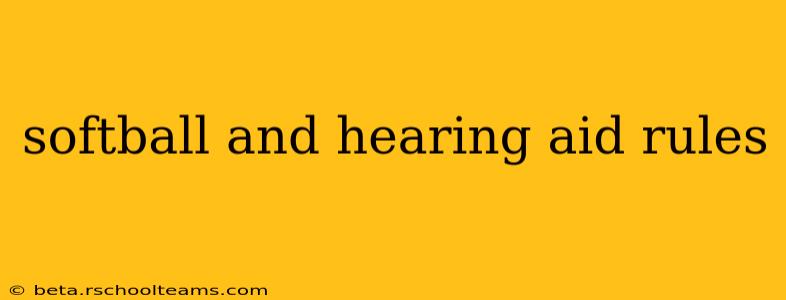Softball is a fast-paced, exciting sport enjoyed by people of all ages and abilities. However, for individuals who use hearing aids, participating can present unique challenges and considerations. This comprehensive guide clarifies the rules surrounding hearing aid use in softball, addressing common concerns and offering helpful advice for players and coaches.
While there isn't a specific, universally recognized rule explicitly addressing hearing aids in softball, the overarching principles of safety and fair play guide how these situations are handled. The focus is primarily on ensuring the hearing aid doesn't pose a risk to the wearer or other players, and doesn't provide an unfair advantage.
Are Hearing Aids Allowed in Softball?
Generally, yes, hearing aids are allowed in softball. However, it's crucial to ensure they are securely fitted and unlikely to fall out or cause injury. The decision often rests on a case-by-case basis, considering the specific design of the hearing aid and the player's individual circumstances.
Can Hearing Aids Fall Out During Play?
This is a common concern. The risk of a hearing aid falling out depends on several factors:
- Type of Hearing Aid: Behind-the-ear (BTE) aids are generally more secure than in-the-ear (ITE) or completely-in-canal (CIC) aids.
- Fit and Securing Mechanisms: A properly fitted hearing aid, perhaps with additional securing measures like retainers or ear molds, is less likely to fall out.
- Intensity of Play: More vigorous play increases the risk of dislodgment.
Players should test their hearing aid's security during practice and consider using additional securing mechanisms if necessary.
What Should I Do if My Hearing Aid Falls Out During a Game?
If a hearing aid falls out during a game, the player should:
- Immediately stop playing. Safety is paramount.
- Retrieve the hearing aid carefully. Avoid stepping on it or causing further damage.
- Inform the coach or umpire. This ensures the situation is acknowledged and appropriate action can be taken.
- Decide whether to resume play. This decision depends on the individual's comfort level and the severity of the disruption.
Do Hearing Aids Provide an Unfair Advantage?
No, hearing aids do not provide an unfair advantage in softball. They are designed to improve hearing, compensating for a hearing impairment, not enhance auditory capabilities beyond normal hearing.
Can I Wear a Headband or Other Protective Gear with My Hearing Aid?
Wearing a headband or other protective gear can help secure the hearing aid and provide additional protection. This is a good practice, especially for those using ITE or CIC aids. However, ensure the headband or gear doesn’t interfere with the hearing aid’s functionality or fit.
What About Ear Protection and Hearing Aids?
Wearing additional ear protection along with a hearing aid isn't generally recommended unless specifically advised by an audiologist. The combination might cause discomfort or interfere with the hearing aid's function. Focus on securely fitting your hearing aid instead.
What if My Opponent is Wearing a Hearing Aid?
Remember that players wearing hearing aids should be treated with respect and understanding. Their hearing loss is a personal matter, and any concerns about their equipment should be addressed with sensitivity and consideration for their safety and well-being.
By understanding these considerations, players and coaches can ensure a safe and inclusive environment for all participants in softball, regardless of their hearing ability. Remember always to prioritize safety and fair play. Consult with an audiologist for personalized advice regarding hearing aid use during physical activity.
